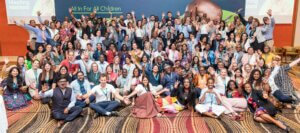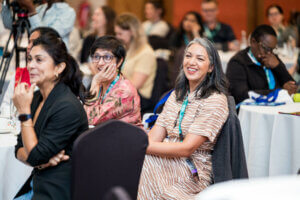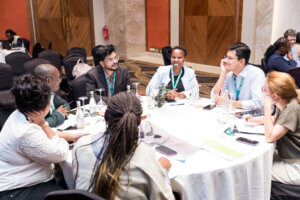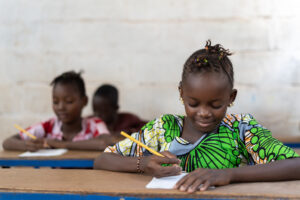An organisation’s theory of change (TOC) is like a roadmap, guiding its path toward achieving goals. For Sabre Education, this goal is to provide kindergarten children in Ghana with the best possible early childhood education (ECE) through partnering with the government to implement play-based learning at scale. Critical to this is the adoption of play-based learning in both the public and private school sectors.
Exploring Sabre Education’s journey, we highlight how they are working to adapt their effective kindergarten teacher training model from public to private schools. This exploration emphasises Sabre’s use of a scoping study to deeply understand and address challenges unique to the private sector. It also showcases the process of tailoring their theory of change to meet the specific needs of the private school context.

Sabre Education’s original Theory of Change focussed on public schools.
Background
Ghana is an early childhood education (ECE) leader in Africa, with two years of free, compulsory kindergarten (KG), a robust ECE policy, and a KG curriculum with a play-based, child-centred pedagogy. However, kindergarten classrooms remain overcrowded, many KG teachers have never received formal training in play-based pedagogy, and learning is often rote-based, with minimal creative activities.
Sabre Education focuses on influencing early childhood education policy & practice, training teachers and school officials in quality early childhood education and transforming learning environments to facilitate play-based learning. Sabre Education’s play-based kindergarten teacher training model, working in partnership with the government’s Ghana Education Service, has been immensely successful in addressing these challenges in the public school sector,
Up to 2023, Sabre has trained 4,655 teachers, headteachers and student teachers, with 83% of assessed public school teachers in Sabre’s Eastern Region project demonstrating ‘outstanding’ competency in implementing play-based learning. 1
Sabre’s 2023 evaluation of its flagship 4-year Eastern Region programme showed tremendous success. The evaluation found that 75% of KG learners in Sabre intervention schools achieved target numeracy and literacy skills compared to 27% (numeracy) and 41% (literacy) in non-intervention schools. The study also found that 71% of KG learners in Sabre intervention schools had developed their psychosocial skills compared to 50% in non-intervention schools. 2
44% of Ghanaian children are educated in over 12,000 private KG schools across the country 3, and in urban areas, there are twice as many private KGs (8,398) compared to public KGs (4,040). To progress their mission towards ensuring all KG children in Ghana have access to quality ECE, Sabre’s model had to expand to deliver an equivalent impact in the private school context.
Understanding private schools in Ghana: Conducting a scoping study
In 2022, Sabre Education was selected as a grantee of Global Schools Forum’s Impact at Scale Labs programme and in early 2023, commissioned a scoping study to examine the private sector’s provision of kindergarten education in Ghana to inform Sabre’s work in private schools going forward. The overall aim of the study was to have a better understanding of the problem and to evaluate if Sabre’s solution could address the identified issues (problem-solution fit). The study covered 24 private schools across four regions of Ghana, with data collected through in-depth interviews with proprietors, head teachers, and teachers. Given the increased diversity and autonomy inherent in the private sector, the scoping study was designed to identify the elements of the public-school model that warrant adaptation and those that could be retained unaltered.
The three core aims of the scoping study were to:
1. Explore the contextual differences between public and private schools.
2. Identify the core components of the teacher training model to adapt to the private school context.
3. Understand the role of community and parental engagement.
Scoping study key findings:
- Decision-making and feedback process
Public schools’ decisions are often made through government or regional and district-level approvals, as teachers and administrators in public schools adopt government-approved curricula or methodologies. Conversely, within private schools, securing support is imperative across various levels — spanning from school ownership or board leadership to headteachers, and extending down to individual teachers. Given that parents, as financially invested stakeholders, play a pivotal role in determining educational methodologies, private schools place considerable emphasis on obtaining direct feedback from both parents and students. Consequently, the study revealed notable variations in approaches, shaped by parent preferences and market demands. - Assessments
While teachers and headteachers in private schools are aware of the importance of daily informal learning assessments particularly in early childhood education, most kindergarten teachers still rely on traditional end-of-term exams. - Teacher professional development
A significant number of private school teachers and head teachers have little or no training in delivering the play-based approach defined in Ghana’s 2019 standards based curriculum for kindergarten. Public schools typically have comparably better structured teacher training and professional development opportunities, often mandated, and provided by the government. Private schools vary widely in their investment in teacher training, influenced by budget constraints and financial returns, and therefore often struggle to retain highly trained teachers as they often seek better opportunities elsewhere. - Compliance
Only a fifth of surveyed schools have registered with the Ghana Registrar General’s Department, highlighting a regulatory compliance issue. - Resource challenges
Public schools, especially in underserved areas, often face resource shortages, such as a lack of teaching and learning materials (TLMs). Private schools, with diverse fee structures and varying student populations, face unpredictable resource challenges. Both headteachers and educators voiced concerns about this issue, emphasising the need to either purchase or develop TLMs better suited for the foundational grade levels, since current resources fall short of providing learners with the tools they need to explore topics independently.
Key recommendations:
- Professional pathways for untrained teachers
To enhance the quality of teaching in private kindergartens, there is a need for professional pathways allowing untrained teachers in the private school sector to become diploma or degree-holding teachers. Collaboration with the Ministry of Education, the Ghana Education Service, and the Ghana National Association of Private Schools is crucial to strengthening support and policies, ensuring that Ghana’s education standards are met. Equitable provision of approved textbooks and training in the new curriculum is also urgently required.The study identifies a growing demand for high-quality teacher professional development services at the KG level in private schools. Recommendations include targeted training programs, hybrid and face-to-face models to minimize classroom disruption, and practical, experiential subject content addressing specific knowledge gaps. Emphasis is placed on comprehensive training programs focusing on play-based methods, with regular coaching and mentoring support. - Infrastructure improvement
Private KGs often face poor infrastructure, with over a third having inadequate classrooms and the majority lacking outdoor play areas and equipment. The study suggests concerted efforts by business development services and associations to enhance fee collection models, increase profitability, and link schools with financial institutions for funding. - Impact of COVID-19
Many private KGs are still recovering from the impact of COVID-19-induced closures. The study recommends continuous support, including financial aid, loans, teaching and learning resources, for low-fee private schools to help them deliver high-quality education. - Liaison with educational authorities
Collaboration by Sabre Education with the Ministry of Education, the National Teaching Council (NTC), and the National Schools Inspectorate Authority (NaSIA) could facilitate online and face-to-face training at both in-service and pre-service levels. Accumulating professional development points as a motivation factor for private school teachers to undergo training is suggested, fostering collaboration between private and public education service providers. - Hybrid training models
Exploring a hybrid model for KG teacher training across Ghana’s regions is recommended. Private school proprietors could be incentivized to procure audio-visual materials on a school cluster basis, aligning with successful play-based pedagogy implementation. Investigating the Varkey Foundation’s approach using television and audio links is recommended to lower costs and increase access. - Ongoing support and follow-up
Continuous support, coaching, and follow-up after training sessions are deemed essential. This involves providing guidance, mentoring, and practical opportunities for teachers to effectively incorporate newly acquired knowledge and skills into their teaching methodologies.
Theory of change: Adapting to a new context
Sabre’s TOC for its private school programme represents a strategic effort to integrate play-based learning into the private school sector while upholding the foundational components of the original public school programme. Informed by insights from the scoping study and Sabre’s recent experience working with a small group of private schools, the TOC for private schools includes nuanced adaptations, diverging from the NGO’s public-school TOC.
- The role of key agencies
When working with private schools, there would be a recalibrated relationship between Sabre Education and the Ghana Education Service (GES). While the public-school TOC has Sabre building the capacity of local district GES staff to directly train and support teachers to deliver play-based learning, the private school TOC takes a different tack, focusing on “leveraging previously trained GES Officers as well as a newly developed group of National Trainers’ to train, monitor and supervise private schools.” In this revised approach, Sabre Education assumes the quality assurance responsibility, supervising the delivery of play-based training sessions for teachers and headteachers. This adaptation takes into consideration the fact that Sabre has already trained these GES Officers and national trainers so their skills are being leveraged to extend training to the private school teachers. It is a key aim of Sabre’s to work with the government to align how teachers are trained across the two sectors to ensure consistency and quality.The school monitoring and supervision roles of GES and NaSIA will play a crucial part in assessing private school performance and compliance to governmental regulation over time. This will ensure that headteachers and proprietors have a clear understanding of their schools’ performance and regulatory requirements, and are held accountable for ongoing teacher training and development. - Engaging proprietors
Setting itself apart from public schools, private school engagements extend beyond teacher and headteacher training. Owners of private schools actively participate in the training, fostering support for the play-based teaching approach and infrastructure enhancements. These proprietors will be actively involved across all levels, undergoing teacher training themselves, providing coaching and mentoring to teachers, and engaging with parents to promote the play-based approach. - Cost Sharing Model
Given that private schools operate as ‘for-profit’ entities, Sabre is putting in place a component of cost-sharing with these schools, a dynamic that is absent in the public sector. This serves as a tangible demonstration of the commitment from private schools to actively participate in the teacher training program, simultaneously contributing to the sustainability of Sabre’s program delivery.

Sabre Education’s revised Theory of Change for the private sector
- Advocating for quality ECE
The public school TOC reflects greater advocacy for increased government funding and national policy changes. It also focuses more on parental/community mobilisation, parent-teacher associations, and collaboration with local government authorities. The private schools TOC instead focuses on strengthening the role of government agencies in overseeing the performance of private schools, working with the government to align teacher training across both the public and private sectors and empowering the schools for active parental engagement and participation. It places a greater emphasis on enhancing the support provided by the education system to private schools. - Teacher professional development
Finally, key stakeholders, including NaSIA and the NTC, will be involved and engaged to consider the possibility of teacher licensing and adherence to best practices for private school teachers. This involvement is anticipated to significantly boost teacher motivation in private schools and elevate teaching quality.
Conclusion
A theory of change is an essential tool for mapping an NGO’s intervention, which requires a comprehensive understanding of the context in which the organisation is working. While expansive scoping studies and pilots like the ones undertaken by Sabre Education can provide important insights, there are alternatives for those constrained by resources or time. Consultations, stakeholder interviews, and discussions with people on the ground can yield valuable information. Gathering insights into the dynamics of the beneficiary community early will create a more comprehensive TOC.
While Sabre’s public and private school TOCs both aim to improve education outcomes, the context, stakeholders, and mechanisms of change vary. By highlighting the existing gaps in the education sector and pushing for positive reforms towards play-based learning, Sabre plays a crucial role in shaping a more inclusive and effective educational landscape across both public and private schools.
References
- 2021 Teacher Monitoring Checklist administered by the Ghana Education Service with support from Sabre.
- End of Project Evaluation Report – Sabre Education’s ‘Transformational Kindergarten Teacher Training in the Eastern Region, Ghana’ 2023 by JMK Consulting Ltd.
- Ghana Education Service EMIS data, 2020/21 as cited in Scoping Study On Private Kindergarten School Providers in Ghana, July 2023 by Associates for Change (AfC).
Related tools in the Scale Toolkit
Theory of Change
MEL Framework












 Climate and Education
Climate and Education
